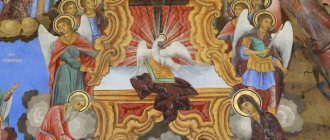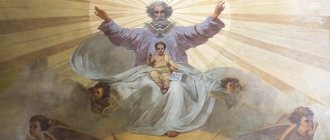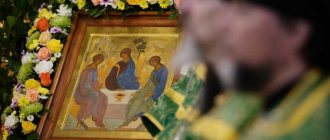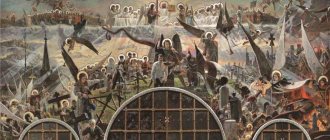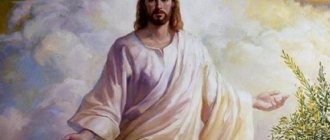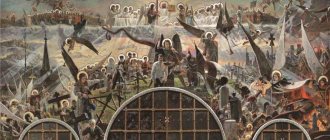Bible Questions and Answers
Published 11/30/2020
When the Deity of Jesus Christ is mentioned, it refers to the teaching that Jesus is God by nature. Almost all those who call themselves Christians accept this most important of all biblical teachings. One of the most significant exceptions to this number are Jehovah's Witnesses. The founder of their movement, Charles Russell, and the second leader of Jehovah’s Witnesses, “Judge” Rutherford, are to blame for this. This religious group considers Christ the greatest of angels - the first creation of God, while denying His Divinity and not considering Him to be God.
Does the New Testament speak about the Divinity of Christ—that Jesus Christ is God? Of course yes! Many passages in the Bible prove this fundamental doctrine. Here are just a few of the Bible passages:
Bible on the Deity of Christ and the Holy Spirit
Biblical Revelation teaches us that God, the Creator of the universe, is, firstly, the One God and, besides Him, there is no other god. Secondly, it teaches that the One God, besides Whom there is no other god, is known and exists in Three Persons, as God the Trinity - Father, Son and Holy Spirit, Who are not three Gods, but One God, besides Whom there is no other god . The doctrine of the Triune God is completely incomprehensible to the human mind; it is a miracle of miracles and a mystery of mysteries. This is what the Church of Christ teaches, which, according to the Apostle Paul, is the pillar and foundation of the truth (1 Tim. 3:15), and about which it is said that the powers of hell will not overcome it (Matt. 16:18). This is what the Bible teaches us, many of whose texts reveal to us this Divine secret. Let us first consider the passages of Holy Scripture that confirm that the Son of God, who became Christ for the salvation of people, is the True God, completely equal in nature to God the Father.
Jesus never called the disciples to worship themselves or the Holy Spirit, but only God.
“He said to them: When you pray, say: Our Father who art in heaven!” (Luke 11:2).
“Truly I say to you, whatever you ask the Father in My name, He will give it to you” (John 16:23).
“But the time is coming, and has now come, when the true worshipers will worship the Father in spirit and truth, for the Father seeks such to worship Himself” (John 4:23).
If Jesus had been God, he would have insisted on worshiping himself. But since Jesus commanded the worship of God, he himself is not God.
I. Bible texts confirming that Jesus Christ is the true God, equal to God the Father
Holy Scripture calls Christ the Son of God. This means that He was born of God. Born before he became a man, before the world was created, before earthly time began. From this alone we can say that the Son of God is God. Why? Because elementary common sense tells us that from a fish a fish is born, from a bird a bird is born, from a man a man is born, and therefore from God, God is born and no one else. A man cannot give birth to a bird, and a fish cannot give birth to a man. In the same way, God - He gives birth to God, equal to Himself. Similar relationships exist among people: in an ordinary human family, the son has exactly the same nature as the father, he is equal to the father in everything. Even though he is still a baby now, the son is potentially the heir to his father’s estate, he has legal rights to the inheritance, taking possession of which is only a matter of time.
Thus, even among people, in the conditions of earthly time, the son is equal in dignity to the father in everything. Moreover, such equality takes place where the Son of God is born from the Father, that is, in eternity. For in eternity there is no time, there is no change in age, and therefore Christ, born of the Father pre-eternally, that is, before earthly time has passed, is always equal to the Father and has equal dignity with Him in everything. And it must be said that this is exactly how the Jews understood Christ’s preaching that He is the Son of the Heavenly Father. In the Gospel of John we read: “And the Jews sought even more to kill Him, because He not only broke the Sabbath, but also called God His Father, making Himself equal with God.”
(John 5:18).
So, from the fact that Christ is the Son of God, it immutably follows that He is true God, equal to the Father. It is in vain that some object that both Angels and people are called sons of God in the Bible many times: “... when all the sons of God shouted for joy...”
(Job.38:7);
“I said: you are gods, and the sons of the Most High -
all
but you will die like men..." (Ps. 81:6),
"...to those who believe in His name He gave power to become children of God"
(John 1:12) and many others.
etc. However, in all these cases we are talking about something completely different - about adoption to God by Grace, and not about natural sonship, not about equality in essence. Yes, Angels and righteous people can be called sons of God, and even gods, but not in the proper sense of the word, but only by communion and closeness to God, by adoption, by Grace. In relation to Christ, the expression “Son of God” is used in the proper sense of the word - that is, He is the Son of God, identical with the Father in terms of a common Divine nature, in a single Divine essence. Where can you see this? This is evident from the fact that Christ is called the Only Begotten in the Bible: “...he who does not believe is already condemned, because he has not believed in the name of the Only Begotten Son of God”
(John 3:18)
4
.
The word “only begotten son” (Greek ο ο μονογενής υιός) when applied to people means “only son” and is used when the father has only one son and no more children. Therefore, the expression “ Only Begotten Son of God”
means that God the Father has only one Son in the proper sense of the word.
This Son, when the time came, became incarnate and became a Man - Jesus Christ. That is why in the Bible the term “only begotten” is never applied to any Angels or any righteous people - where they are called sons of God. Christ is the Son of God in an essentially and fundamentally different sense of the word than the Angels and the righteous. The Apostle Paul speaks about this: “...to which of the angels did God say: You are My Son, today I have begotten You”?
(Heb. 1:5)
Further, about the pre-eternal birth of Christ, the prophet David says: “... from the womb before the morning star, your birth was like dew.”
(Ps. 109:3). The Bible never speaks like this about any Angels or people. Angels and men were created from nothing, but the Son of God is born “from the womb” of the Father. The expression “from the womb” (Heb. מרחם) means “from the breast,” “from the heart,” “from the inner being,” just as in humans a mother gives birth to a baby. The baby, as already said, is the legal heir of the mother and is equal in essence and dignity to her. In the same way, the Son of God, born from the heart of the Father, has with Him the same Divine nature and equal Divine dignity.
The Bible and in many other places fully confirms the birth of the Son of God from the very essence of the Father and the complete unity and equality of the Son and the Father. Here, for example, are the words of Christ Himself, who says about His relationship with the Father: “I and the Father are one.”
(John 10:30), that is, one being, one nature, one Divinity.
And in another place He says: “He who has seen Me has seen the Father”
(John 14:9).
Likewise, the Apostle Paul testifies of Christ that “in Him dwells all the fullness of the Godhead bodily”
(Col. 2:9). Which of God's creations can say about himself that all the fullness of the Divine dwells in him? Nobody. Even the highest Archangels - Michael, Gabriel and others cannot say this about themselves. They, of course, are involved in God, close to Him, but they cannot contain the fullness of the Divine. Nothing created can contain and bear the fullness of the Divine. All the fullness of the Divine can reside only in the True God and in no one else. If she abides in Christ, then this can only mean one thing: Christ is the True God.
But here is the well-known first verse of the Gospel of John: “In the beginning was the Word, and the Word was with God, and the Word was God... all things came into being through Him.”
(John 1:1).
It is said quite clearly: the Word (Greek Λόγος - Logos) is God. The same God, the Creator and Creator, who created the heavens and the earth, as the first lines of the Bible tell about it (very, by the way, very consonant with the Gospel words in question): “In the beginning God created the heavens and the earth”
(Gen. 1:1).
The Evangelist John says of the Word that It was “in the beginning”
.
In the books of Holy Scripture, the expression “in the beginning” often indicates the beginning of the world. It is in this sense that it is undoubtedly used here. And from this it follows that in the beginning, when God began to create everything - in this very “beginning”, the Word already existed
.
One Bible interpreter, commenting on this passage, says: “The words of the evangelist have the following meaning: The Word was already when the world began to be built, that is, the Word was before the world was built, but if the Word was before the world, it means that It was before time, for the beginning of the world is at the same time the beginning of time; before the creation of the world there was no time; and what was before time was from eternity, therefore, the existence of the Word is eternal, without beginning. And what does not have a beginning of its existence cannot have an end; therefore, the existence of the Word is eternal in the full sense—beginningless and infinite.” Such an existence, of course, can only be had by God, and it is precisely this kind of Divine existence that Christ Himself testifies to when, for example, He says the following: “ And now Thou glorify Me, Father, with Thyself, with the glory which I had with Thee before the world was.”
(John 17:5).
Some, however, argue that the word “God” is used by the Evangelist John (John 1:1) not in the proper sense of the word, that there is only one true God - this is God the Father, while God the Word who became incarnate and became Christ is not God equal to Him. To prove this, they usually refer to those places in the Bible where Christ is spoken of as if as a Being subordinate to God the Father. So, for example, they cite the text of the Gospel, where Christ says: “My Father is greater than I.”
(John 14:28).
They also point to the words of the Apostle Paul: “The head of every man is Christ, the head of a woman is her husband, and the head of Christ is God”
(1 Cor. 11:3).
However, you should know that these words of Holy Scripture not only do not refute, but, on the contrary, confirm the Divine nature of Christ and His complete equality with God the Father. Indeed, if we think about the above words of the apostle, then from the example of the relationship between husband and wife we will see that although the husband is undoubtedly the head of the wife, this does not mean that the wife, in comparison with the husband, is a being of a lower nature . A wife by her nature, by her dignity, is equal to her husband, and moreover, not just equal, but one with him. After all, the Bible teaches that a husband and wife are one flesh, they are one and together they constitute one nature, as the Lord said about this: “... a man will leave his father and his mother and cleave to his wife;
and they will become one flesh” (Gen. 2:24).
So, let’s reason: is a husband a person? - Yes. Is the husband the head of the wife? - Yes. But despite this, the wife is also a person? - Yes. Consequently, both husband and wife are both people, they are equal and have the same nature, the same human dignity. But with all this, the husband is the head of the wife. By analogy with this, one should think about the relationship of Christ with the Heavenly Father: Is the Father God? - Yes. Is the Father the head of Christ? - Yes. But, despite this, Christ is also God, He has the same Divine nature and dignity with the Father, They are one
- (
“I and the Father are one”
John 10:30).
Further: just as a wife, recognizing the fact that her husband is the head for her, can (despite her equal human dignity with her husband) in a sense say that my husband is more than I, so Christ does the above words: “ Father Mine is greater than Me"
(John 14:28) - speaks in a similar sense, and His complete equality with the Father is by no means denied by these words.
The Apostle Thomas said to Christ, who appeared after His Resurrection: “My Lord and my God”
(John 20:28).
Everyone knows well to what extent the Jews were scrupulous and what zeal they had in matters of the glory of God - after all, they well remembered that Jehovah God is a jealous God, Who said to His people: “You must not worship any god other than the Lord (
Jehovah – Heb. יהוה);
because His name is Zealot;
He is a jealous God” (Ex. 34:14).
And again: “ I am the Lord (
Jehovah – Heb. יהוה),
this is My
Is. 42:8). Therefore, the Apostle Thomas would never call God someone who is not Him. And most certainly these words would never have been included in the Holy Scriptures if those who wrote the New Testament, that is, the apostles, did not know with the utmost degree of certainty that Christ is the true God, equal in His Divine dignity to Jehovah God.
In the same way, the holy evangelist Matthew would never have put the name of the Son on a par with the name of the Father - (" So go and teach all nations, baptizing them in the name of the Father and the Son and the Holy Spirit"
(Matthew 28:19) - if the Son did not have equal Divine dignity with the Father.
Further: the Apostle Paul, enumerating the Persons of God of the Trinity, sometimes even puts the name of God the Father not in the first place: “ The grace of our Lord Jesus Christ, and the love of God the Father, and the fellowship of the Holy Spirit be with you all. Amen"
(2 Cor. 13:13), - would the Apostle Paul, who was, in his own words,
“an immoderate zealot of the traditions of the fathers”
(Gal. 1:14), a zealot for the glory of God, write this way - would he have written this way if Christ and the Holy Spirit would not have the Divine dignity equal to the Father? Of course, I would never write it.
Also, the eldest of the apostles, Saint Peter, would never have said about the name Jesus,
– that
“there is no other name under heaven given among men by which we must be saved”
(Acts 4:12).
Didn’t Peter know that through the great prophet Moses the terrible and most sacred name of God was given to the Jews - Jehovah (Heb. יהוה)? Didn’t he know the prophetic words that he who calls on the name of Jehovah is saved? For the prophet Joel said: “Whoever calls on the name of the Lord (
Heb. יהוה)
will be saved” (
Joel 2:32)?
Didn’t he know that the Lord Himself said that Jehovah is His name forever (Ex. 3:15)
?
Of course, Peter knew all this. How could he replace this great name of God, about which David said: “Holy and awesome is His name”
(Ps. 111:9), - how could he replace it with another name -
Jesus
?
How could he dare, how could he dare to do this? But Saint Peter does this without any hesitation, for he knows that the name Jesus is a name no less holy and no less terrible than the name of Jehovah, because it is the name of the Son of God, equal to Jehovah in one common Divine nature. And the Bible especially emphasizes that Peter speaks his words (that there is no other name by which we must be saved), “filled with the Holy Spirit”
(Acts 4:8), in order to testify to everyone that this was not invented by men, but is a new Revelation from the True God, given to the world for the salvation of the world.
For the same reason - the zeal for the glory of Jehovah of the biblical writers - they would never have called Christ in their writings by the same names as Jehovah, if they had not had perfect knowledge of His true Divine dignity. And there are many such places in the Bible. For example, Jehovah speaks about Himself through the prophet Isaiah: “ I am the first and I am the last
, and besides Me there is no God” (Is. 44:6), and in the Apocalypse of John the Theologian we read about Christ: “...write: thus says the First
who was dead, and behold, is alive...” (Rev. 2: 8).
Jehovah says about Himself: “I, I am the Lord, and there is no Savior besides Me
"(Isa.43:11).
And about Christ, the Apostle Paul says: “...waiting for the blessed hope and the appearing of the glory of our great God
” (Titus 2:13).
About the Second Coming of Christ it is said that it will be revealed by the Lord Almighty - “... the blessed and only mighty King of kings and Lord of lords
, the only one who has immortality, Who dwells in the unapproachable light, Which no man has seen and cannot see.
Honor and eternal power to him! Amen" (1 Timothy 6:15-16). And about Christ in the Apocalypse it is said: “They will fight with the Lamb, and the Lamb will defeat them; For He is the Lord of lords and the King of kings
, and those who are with Him are called, and chosen, and faithful...” (Rev. 17:14).
Jeremiah, in a famous messianic prophecy, even directly calls Christ by the name of Jehovah: “ Behold, the days are coming, says the Lord, that I will raise up a righteous Branch for David, and a King will reign, and will act wisely, and will execute judgment and righteousness on earth. In His days Judah will be saved and Israel will live in safety; and this is His name by which they will call Him: “Lord
(Heb. יהוה)
our justification!
(Jer.23:6)
In addition, the full Divine dignity of Jesus Christ is clearly visible from a careful comparison of many parallel passages in the Bible, where different sacred writers narrate the same events of Sacred history or the same prophecies. For example, the prophet Isaiah speaks about one of his visions: “...my eyes saw the King, the Lord
(Heb. יהוה)
of hosts"
(Isa. 6:5).
And the holy evangelist John, describing the same vision of the prophet, claims that the eyes of Isaiah saw Jesus: “ Isaiah said this when he saw His glory and spoke about Him”
(John 12:40-41). Let us ask the question: how can it be that the prophet Isaiah, looking at Jehovah, seeing His glory and speaking about Him, saw the glory of Jesus and spoke about Jesus? Answer: This can only be the case if Jesus shares the same common Divine nature with Jehovah.
There are many other similar passages in the Bible. Let's list some of them. The book of Acts says that Christ was raised from the dead by the Lord God: “ God raised him up on the third day.”
and gave Him to appear...” (Acts 10:40).
And Jesus says about His Resurrection that it was He who resurrected Himself: “Jesus answered and said to them, Destroy this temple, and in three days I will raise it up
” (John 2:19).
Narrating about the crucifixion of Christ, the Evangelist John refers to the prophet Zechariah: “...they will look at Him whom they have pierced.”
(John 19:37).
However, in Zechariah, in the original Hebrew (as well as in the Greek translation of the Seventy, and in the Latin Vulgate), we read the following words of Jehovah: “ והביטו אלי את אשר־דקרו
”, which literally means “...and they will look on
” (Zechariah 12:10). That is, we are talking here about Jehovah Himself being betrayed to death. And this can only be explained by the fact that the Divine nature of Christ and the Divine nature of Jehovah are one and the same common Divine nature.
The Holy Prophet David says in the psalm: “ In the beginning You founded the earth, and the heavens
are the work of Your hands; they will perish, but You will remain; and they will all wear out like a robe, and like a garment You will change them, and they will be changed; but You are the same, and Your years will not end”
(Ps. 102:26-27). There is no doubt that these words were spoken about Jehovah, the Creator of the universe. However, the Apostle Paul in his Epistle to the Hebrews (Heb. 1:8-12) states that David is speaking here about Christ. And from this it follows that Christ is the same Creator of the universe as Jehovah God is.
Another example: in the Gospel of John, Christ says about His followers that He gives them eternal life and that “...no one will snatch them out of My hand.”
(John 10:28).
And further he says: “My Father, who gave them to Me, is greater than all;
and no one can snatch them out of the hand of My Father” (John 10:29).
From this it is clear that snatching sheep from the hand of Christ is the same as snatching them from the hand of the Father. Consequently, the hand of Christ and the hand of the Father are one and the same hand - the hand of the One God, which is owned equally by both the Father and the Son. This is exactly how Christ Himself explains it, continuing his speech: “I and the Father are one”
(John 10:30).
By “hand”, according to the interpretation of the holy fathers of the Orthodox Church, here we should understand the power and authority of the Divine. Why and in what sense it is said about the Father that He is “greater than all”
has already been discussed above - in the interpretation of John 14:28 and 1 Cor.11:3.
So, the above texts of the Bible clearly testify to the true Divinity of Christ and His complete natural unity and equality with God the Father. However, it should also be said that in the Holy Scriptures there are many other texts that speak not about the Divinity, but about the humanity of Christ, that Christ is a true Man, that He has a common human nature with us. And, of course, deniers of the equality of Christ with God the Father are very fond of referring to these texts. Therefore, let’s say a few words about the problem of correctly understanding all such passages, of which there are indeed a lot in the Bible. Let's point out some of them. First of all, Christ Himself repeatedly called Himself “Son of Man” or even simply “Man.” “You seek to kill Me, the Man who told you the truth”
(John 8:40), He says to the Jews.
The apostles often called Christ Man. “There is one God, and one mediator between God and men, the man Christ Jesus”
(1 Tim. 2:5), - the words of the Apostle Paul. The human nature of Christ is also indirectly evidenced by those numerous texts of Scripture, from which it is clear that Christ had all the qualities of earthly human nature. For example, He was tired from the journey and the heat (John 4:6), needed sleep, food and drink (Mark 4:38; John 4:7; Matt. 21:18), experienced emotions typical of people, for example, joy and love (John 11:15; Mark 10:21), anger and sorrow (Mark 3:5; Mark 14:34). All this, of course, irrefutably testifies that Christ is a real, real, earthly Man.
But there is no dispute about this; Christian theology has never rejected the full earthly humanity of Christ. It was rejected by heretics (Docetes, Apollinarians, etc.). True Orthodox theology has always categorically insisted that Christ is a true Man. However, at the same time, it equally categorically asserted that He is at the same time the true God. Christ has two natures - Divinity and humanity, He is the God-man, that is, at the same time both God and Man. Not a demigod-half-man, but a complete perfect God and a complete perfect Man, united in one Person. Therefore, to the question whether it is true that Christ is a true and real Man, one should answer that yes, it is true, but this is not the whole truth, but only half the truth. The second half of the truth is that Christ is at the same time the True God. In the single personality of Christ, two natures were united - Divinity and humanity, and each of these natures manifested itself in its own way during the earthly life of Christ. “In every action of Christ,” says V. Lossky, “one can see two different actions, since Christ acts in accordance with His two natures, through both of His natures, just as a red-hot sword cuts and burns at the same time : He cuts because he is iron, and he burns because he is fire. Each nature acts in accordance with its properties: the hand of Man raises a maiden from her bed, the Divinity resurrects her; Man's feet step on the surface of the waters, the Deity strengthens the water surface. “It was not human nature that raised Lazarus, but it was not the Divine that shed tears at his tomb,” says Saint John of Damascus.” So, this is precisely what should explain the well-known fact that Holy Scripture sometimes speaks of Christ as God, and sometimes as Man. This biblical teaching about the God-man, about the union of two natures in the single person of Christ, is the unshakable cornerstone of Christian theology, without which Christianity does not and cannot exist.
Now that we have examined the biblical evidence about Christ, the Son of God, let us turn again to the Holy Scriptures and try to determine what it tells us about the third Person of the one God of the Trinity - the Holy Spirit.
Why Jesus is God - Chinese Philosophy
Around the same time, in the 6th century BC. The ancient Chinese philosopher Lao Tzu wrote: “Tao is the deepest gate of birth. The deepest gate of birth is the root of heaven and earth. Tao exists forever, like an endless thread, and its action is inexhaustible.”
Lao Tzu, when he writes that the comprehension of Tao is like the state of a baby. The baby does not have logic, but has the original wisdom, which is Tao. We read above that there was a true Light, which enlightens every person who comes into the world. Gospel of John chapter 1.
Lao Tzu, having managed to tear his thoughts away from the earthly, raised them to the heavenly and realized what was already in him and wrote about it. Tao denotes in Chinese philosophy the eternal action or principle of creation, from which the origin of uniqueness and duality, and at the same time the beginning of the world and creation. The same as what we read in the Bible. The concept of Tao, revealed to the Chinese, is similar to the concept of Logos, revealed to the Greeks. This is a universal law, the beginning of the world, harmony, and it refers to the root cause of the universe, and the mysterious and unknowable pattern underlying it, and the integrity of life. (the great limit of Chinese 太極), one gives rise to two - Yin and Yang (Chinese 陰陽), which, when in motion, become three and give birth to the entire manifested world (Chinese 萬物 / 万物, wànwù). That is, Tao is the source of life. At the same time, it is the energy that shapes the entire process of creation and creation. This is the creative spirit that creates.
and without Him nothing began to be that began to be. Gospel of John Chapter 1 Do you catch the similarities? Read the first chapter of the Gospel of John. When they translated the Gospel for the Chinese, they translated it like this;
In the beginning there was Tao and Tao was with God and Tao was God.
It was in the beginning with God.
3 Through Him all things were made, and without Him nothing was made that was made.4 In Him was life, and the life was the light of men.
And Tao became flesh and dwelt with us, full of grace and truth; Gospel of John chapter 1
II. Bible texts confirming that the Holy Spirit is true God, equal to God the Father
The Bible speaks more secretly about the Holy Spirit than about the Father and the Son. Saint Gregory the Theologian wrote that the revelation of God the Trinity was given to people gradually: “The Old Testament clearly preached the Father, and not with such clarity the Son; The New One revealed the Son and gave instructions about the Divinity of the Spirit; Now the Spirit abides with us, giving us the clearest knowledge of Him. It was unsafe to clearly preach the Son before the Divinity of the Father was confessed, and before the Son was recognized... to burden us with preaching about the Holy Spirit, and expose us to the danger of losing our last strength, as happened to people who were burdened with food taken in excess or weak still direct your vision to the sunlight. It was necessary for the Trinity light to illuminate those being enlightened with gradual additions, receipts from glory to glory.”
Nevertheless, one can point to many biblical texts that say that the Holy Spirit is true God, equal to the Father and the Son. Before listing some of these texts, it is necessary to say at least briefly about the need to distinguish the Person of the Holy Spirit from the Grace of the Holy Spirit. The Holy Spirit in the proper meaning of this name is a Person, and not at all some kind of impersonal force: He is one of the three Persons of God of the Trinity. The independent personal principle of the Holy Spirit is evident, for example, from the following words of the Holy Spirit Himself: “ Set apart for Me Barnabas and Saul for the work to which I have called them.”
(Acts 13:2). It is quite obvious that only a Self-conscious Personality can say such words about Himself, and not some impersonal force or energy. The Grace of the Holy Spirit is recognized in Orthodox theology as energy emanating from God and not having an independent personal beginning. The grace of the Holy Spirit and the Holy Spirit Himself are not the same thing, although in the Bible the Grace of the Holy Spirit is often simply called by the name of the Holy Spirit Himself. This happens for the reason that Grace, that is, the power and energy of God, most often comes to us and acts in the world precisely through the third Person of the Trinity - through the Person of the Holy Spirit.
So let's see what the Bible tells us about the Holy Spirit. Here, for example, are the last words of the prophet David: “The Spirit of the Lord speaks in me, and His word is on my tongue. The God of Israel said..."
(2 Samuel 23:2-3) Here we see that David calls the Holy Spirit the God of Israel. Why is he doing this? Does he not know that the God of Israel is Jehovah God? Of course, David knows this, but he says this because the nature of the Holy Spirit is the same as the nature of Jehovah God.
And here is what the Apostle Peter says to Ananias in the book of Acts: “Why did you allow Satan to put into your heart the thought of lying to the Holy Spirit... You lied not to men, but to God.”
(Acts 5:3-4). If lying to the Holy Spirit is the same as lying to God, then this means that the Holy Spirit is God, that He has true Divine dignity.
It was said above that, due to zeal for the glory of God, the Evangelist Matthew would never have put the names of the Father and the Son on the same line - (" So go and teach all nations, baptizing them in the name of the Father and the Son and the Holy Spirit"
(Matthew 28:19) - if I did not have the most reliable knowledge of the equal Divine dignity of the Father and the Son. However, for the same reason, he would never have included the name of the Holy Spirit in this series if he had not undoubtedly known about His perfect equality and consubstantiality with the Father and the Son.
The Apostle Paul says to the Corinthian Christians: “You are the temple of the living God, as God said: I will dwell in them and walk [in them]; and I will be their God, and they will be My people."
(2 Cor. 6:16) .
The meaning of the apostle's words is clear: Christians are the temple of God because God dwells in them. However, in another place the Apostle Paul says the following to these same Corinthian Christians: “Do you not know that you are the temple of God, and the Spirit of God dwells in you?”
(1 Cor. 3:16) So, about the indwelling of God, which makes Christians the temple of God, the apostle in one place says that this is the indwelling of Jehovah God, and in another, that this is the indwelling of the Holy Spirit. And from this it follows that one and the same Divine nature belongs equally to both Jehovah God and the Holy Spirit.
Righteous Job says about the Holy Spirit that He is the Creator of man: “The Spirit of God created me”
(Job 33:4).
If we compare this passage with the very beginning of the book of Genesis, where it is told how Jehovah God created man - “And the Lord (
Heb. יהוה) God
Gen. 2:7) - then it becomes obvious that that the Holy Spirit is the same Creator of man as Jehovah God is.
Central dispute
Photo: Flickr.com
This question has concerned believers for many centuries. Modern theologians note that the identification of Jesus Christ with God concerns one of the cornerstone truths of the Orthodox faith.
This issue often occupied a central place in disputes between followers of Christianity and representatives of various heretical movements. One of the most persistent such confrontations occurred in the 4th century, when the struggle against the Arians was waged. Then the foundations of the Orthodox Church were defended, thanks to a number of prominent Christian figures of that time - Nicholas the Wonderworker, Basil the Great, Spyridon of Trimythous, John Chrysostom.
Currently, such doubts mainly come from representatives of sectarian teachings. At the heart of this doubt are fundamental errors regarding the sincerity of a person's faith. Among them, the central place is occupied by the inability to accept and understand the religious teaching of the Holy Trinity. This is where many other popular misconceptions come from.
All this leads to literalism. This is considered especially dangerous, since an initially false and erroneous judgment is covered up by the authority that belongs to the New Testament. The essence of literalism is elementary: a person strives to select only those expressions and words that correspond to his ideas and confirm the arguments he puts forward.
There are many examples of such literalism in the modern world. For example, in Orthodoxy there are many icons, although from the New Testament they quote “do not make images,” priests bless soldiers for battle, although one of the commandments says “Thou shalt not kill.”
Denying the Deity of Jesus is one of the classic examples of literalism. Proponents of this version cite several quotes in support of their words in which Jesus Christ speaks of his Father as God:
“I have not yet ascended to My Father; But go to my brothers and say to them, “I am ascending to my Father and your Father, and to my God and your God” (John 29:17)
^III. conclusions
Thus, biblical Revelation teaches us that God is One in His Essence and Trinity in Persons. Each Person, or Hypostasis, is a Personality that has some of its own special personal properties. We know little about these personal properties. Thus, the Personal attribute of the Father is ungeneracy
;
the personal property of the Son is that He is pre-eternally born
the Father;
and the personal property of the Holy Spirit is that He eternally emanates
the Father.
But each Person, each of the Three Persons has the same Divine nature, common and united for all of them. The Father is the True God, the Son is the True God, the Holy Spirit is the True God. And All Three
are
One
True God.
Why Three
Are the Persons One and One
God? Firstly, They are united because of Their perfect Divine mutual love. Secondly, They are one because all Three have the same common Divine nature. The Holy Fathers gave the following comparison: if three lamps are burning in a room, then the light with which they fill the room is the same in nature and in its effect, although it comes from three different sources. And thirdly, the Persons of the Trinity are one, because they are not separated by anything: neither their will, nor action, nor space, nor time.
The mystery of the Holy Trinity goes beyond the logic and rational thought of man, being completely incomprehensible even for the disembodied heavenly Angelic Forces. And this is not surprising: after all, the properties of God are necessarily His infinity, inexhaustibility and incomprehensibility. Scripture itself tells us about this: “ Almighty! we do not comprehend Him... Therefore let men revere Him, and let all who are wise in heart tremble before Him!”
(Job.37:23-24) If everything in the teaching about God, that is, in theology, were completely and completely clear, then this would mean only one thing: that this teaching is false, that it was not given from God, but was invented by people, invented by the human mind.
By studying the Bible, one can be convinced that the trinity of the Godhead is revealed to us in the biblical texts of both the New and Old Testaments. In the New Testament it is more clear and complete, but in the Old Testament it is often allegorical and hidden. Here, for example, is a picture of God appearing to Abraham in the form of three Strangers: “And the Lord appeared to him
(Heb. יהוה)
near the oak grove of Mamre, when he sat at the entrance to the tent, during the heat of the day.
He lifted up his eyes, and behold, three men stood against him. Seeing, he ran towards them from the entrance to the tent, and bowed to the ground. And he said: Lord! If I have found favor in Your sight, do not pass Your servant past” (Gen. 18:1-3). It is noteworthy that, although there were three Wanderers, Abraham addresses them as One: “Lord!” Holy interpreters, explaining this event, say that God Himself, the Holy Trinity, appeared to Abraham in the form of three Wanderers. This truth is confirmed to us by Orthodox iconography - everyone knows the icon of St. Andrei Rublev - the Trinity. It depicts exactly those Three Men who then appeared to Abraham in the form of Angels, depicted with traveling staffs in their hands, precisely as Wanderers...
The mystery of the Holy Trinity is completely incomprehensible to man. However, in order for us to form at least some kind of concept about Her, familiar to our minds, the holy fathers pointed to some similarities of Her in this world. For example, they pointed to the sun, which illuminates the world and gives it life. Three things are distinguishable in the sun: the solar circle, the light born from it, and the heat emanating from it - the circle, light and heat form a single triad, somewhat similar to the Holy Trinity. Maybe that’s why God is sometimes compared in the Bible to the sun: “...The Lord God is the sun and shield”
(Ps. 83:12).
Another comparison is the source of water. It includes a vein of water hidden, for example, inside a mountain, a stream of water flowing out of this mountain, and a river that is formed from the stream and flows over a long distance, giving life to everything. These three things that differ from each other - a vein of water, a stream and a river - form a single flow of water and have the same water nature. Likewise, the Persons of the Holy Trinity, differing among themselves, have one common Divine nature.
There are many other reflections of the Trinity of the Creator in creation. The most basic and fundamental categories of our world - such as time, space, matter - bear its stamp: time, as is known, is of three types - past, present and future; The space in which we live is three-dimensional, matter is found in the universe in three main forms - solid, liquid and gaseous. Also, such a characteristic of light as the color scheme (remember here the words of the Holy Scripture (1 John 1:5) that God is light), which forms all the infinite variety of colors and shades in our world, consists of precisely three primary colors: red , blue and green.
It is not surprising that there are many objects and phenomena in the world that bear the stamp of the trinity of the Divine. After all, among people, any work of art always bears the imprint of the personal characteristics of its creator. It happens, for example, that, having heard unfamiliar music, one can immediately say that such and such a composer wrote it, because only he is characterized by certain musical features and techniques. Or, after reading an excerpt from a book unknown to us, we can often unmistakably identify its author, because only he alone has such and such words and stylistic features. Is it surprising that our world bears the imprint of trinity, if its Creator is God the Trinity, one in essence and trinity in Persons? To him be glory and power forever and ever. Amen.
Notes:
Those who deny the equality of Christ to God the Father usually say that man cannot become God, that it is impossible for man. It's right. But the Church does not teach that the man Christ became God, she teaches that God became the man – Christ. everything is for God
Maybe.
In addition, we should not forget that when the father grows old, then, on the contrary, it is the son who takes on the main role - he supports and cares for the infirm and elderly father.
The eternal birth of the Son of God is spoken of many times in the Bible - see, for example, Ps. 109:3; Micah 5:2; John 17:5. If the Son is born from the Father before time has passed, then this can only mean one thing: there was no such time when the Son did not exist. Consequently, He does not have the beginning of His existence in time, and, therefore, His existence is eternal, that is, such that only the True God, the Creator of the universe, can have.
See also John 1:18; 3.16; 1 John 4:9 etc.
In this verse you should also pay attention to the expression “before the morning star.” The word "star" (Heb. משחר
) means “darkness”, “dawn”, “dawn” - the meaning of this expression is that the Son of God is born before the appearance of light, before the “dawn” of the universe, that is, before the creation of the world. His birth is “like dew” - just as dew is mysteriously born from invisible moisture and has a watery nature in common with it, so the Son of God is incomprehensibly born from the Father and has a common Divine nature with Him.
See, for example, Ps. 101:26; Mark 10:6; Hebrews 4:3, etc.
Jehovah (Heb. יהוה) is the main and holiest of all the names by which God is called in the Old Testament.
Also in another place: “There are diversities of gifts, but the same Spirit; and the services are different, but the Lord is the same; and the actions are different, but God is one and the same..."
(1 Cor. 12:4-6) – here the Holy Spirit is placed in first place.
It is worth remembering here the famous words of Christ: “He who has seen Me has seen the Father” (John 14:9).
10. Grace is also often called in the Bible “the glory of the Lord.” For example, in the prophet Ezekiel we read: “And the spirit lifted me up, and brought me into the inner court, and behold, the glory of the Lord filled the whole temple.”
(Ezek.43:5). (See also Isa.60:1; Luke 2:9; Rev.21:23 and many others.)
11. Here the apostle quotes close to the text the following words of Jehovah God: “And I will make my habitation among you... and I will walk among you and will be your God, and you will be my people.”
(Lev.26:11-12).
12. By the way, for this reason God speaks of Himself when creating man in the plural: “Let us make man in our
and in our
(Gen. 1:26) - for man was created by One God in Three Persons.
13. This single nature of the Divine has the following properties: eternity, immutability, omnipotence, omnipresence, perfect omniscience, perfect wisdom. All these properties belong equally to each of the three Divine Hypostases.
14. Theologians say that the dogma of the Trinity is a cross for human thought and that the ascent of the mind to the Trinity is an ascent to Golgotha.
15. However, pointing out all this, the fathers warned that these similarities are very rough and that in them “even if some small similarity is found, then much more eludes” (St. Gregory the Theologian), and Saint Hilary says: “If we, when discussing the Divinity, we use comparisons, let no one think that this is an exact image of the object. There is no equality between earthly things and God..."
16. By the way, the water molecule itself (and water is not only the substance that underlies all life on earth, but also the element that underlies the entire universe, for it is said that “... in the beginning, by the word of God, the heavens and earth were made from water and by water" (2 Pet. 3:5)
- the water molecule itself bears the imprint of trinity: it, as is known, consists of three atoms - one oxygen atom and two hydrogen atoms - H2O.
The text is based on the edition: Priest Mark. The Bible's teaching on the Divinity of Christ and the Holy Spirit. M., 2011. The brochure was published on the basis of official permission from the censorship department of the Publishing Council of the Russian Orthodox Church.
In the Bible, Jesus denies his divinity
In the Gospel of Luke (18:19), Jesus objects to the man who called him “good”: “Why do you call Me good? No one is good except God alone.”
The Gospel of Matthew (19:17) also says: “Why do you call Me good? No one is good except God alone. If you want to enter eternal
, keep the commandments"
Jesus did not teach people to call themselves God. Otherwise it would appear that he exalts man. On the contrary, Jesus belittled man and claimed that he had no right to be called good. Thus, Jesus denied his divinity.


